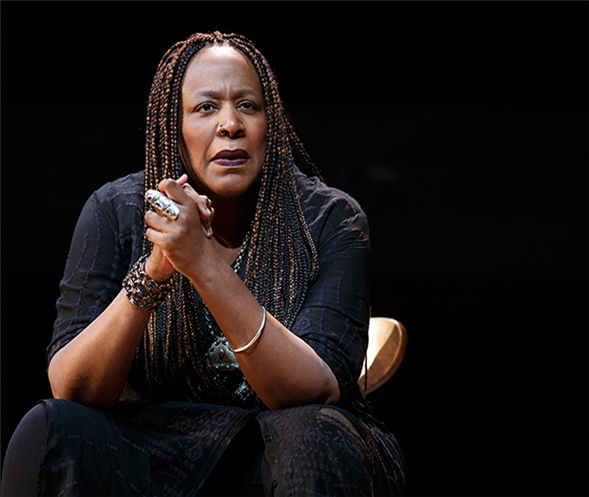Translate Page

Audiences frequently confuse Dael Orlandersmith with the characters she writes and performs. Originally solely an actress, the New York City native began penning her own plays in the mid-90s such as Monster, The Gimmick and Pulitzer Prize finalist Yellowman. Superficially at least, she and her characters do seem to have a lot in common --- they're all brilliant black women trying to transcend difficult circumstances. But while Orlandersmith acknowledges her work often has autobiographical elements, she insists she never truly plays herself, not even in her harrowing new solo show, Forever, at New York Theatre Workshop. That said, it is closest to her real-life experiences.
"Is that me onstage? I mean yes and no," she says with a chuckle. "The quote-unquote daughter character is a composite figure. Certainly Forever is based on my life, but once my personal impressions and thoughts come into it, it's no longer documentary. If the mother character were here, she'd have a totally different take on the story. It's a hybrid of truth, feeling and memory bank."
Forever initially started out as two different projects. Orlandersmith was working on a written memoir called Character and also considering adapting the film Forever, about Paris' historic, artist-packed Père Lachaise Cemetery, for the stage. "There was a character in that movie that I wanted to play," remembers Orlandersmith. "But then Neel [Keller, the director of Forever and her frequent collaborator] came in and said, 'Well, we could get the rights for you to do that character, but I'd rather you write about your personal connection to the cemetery and all kinds of art. Who turned you on to all that?' At first I said, 'Myself,' --- egomaniac, right? And then I thought about it and said, 'Actually, my mother did.' Ravel and Dickens and James Baldwin were all in our house. And then we went from there."
Framed by the unnamed narrator's cathartic visit to Père Lachaise, where she communes with her artistic ancestors like Colette, Richard Wright and Jim Morrison, Forever also explores her toxic relationship with her mother in their downtrodden East Harlem neighborhood. This is no adoring eulogy for the woman who raised her. Instead, Forever is a subjective portrait of the artist as a young, abused woman who finds solace and salvation in music, movies and books.
Orlandersmith's language is poetic and evocative throughout, whether sharing her euphoria at discovering The Doors song "Light My Fire," suffering her mom's drunken physical and verbal assaults, or crushing on the kindly Irish cop who tries to comfort her after she's brutally raped by a stranger as a young teen. Although Orlandersmith explored a few of these experiences in prior works (Monster in particular covers some of the same ground), this is the first time she's written about her mother in such depth. And she found the scene in which she bids her mom's dead body a bitter goodbye especially challenging to craft.
"All the scenes were hard, but the morgue was particularly tough," she says. "In a strange sort of way, we all figure that we and the people we know aren't going to die; we're going to keep going on forever. So our own fear of mortality gets kicked up when we see someone we know lying there dead. Going back there was draining."
Lest anyone mistake Forever for a no-holds-barred confession with an uplifting ending, the play doesn't deliver an easy, feel-good message. "With some other shows, I hear people say, 'Oh, so-and-so is so courageous for telling their story,'" she says. "But I think we've got therapists for that kind of stuff. When writing Forever, I asked myself, 'Are these characters well-rounded? Do we see the daughter's cruelty, too? Do we have compassion for the mother as well as seeing the horror of her?' The incidents are true but my take on them is theatrical. It's not a chatty talk show or, oh god, reality TV. I want it to be the kind of piece that other performers can do."